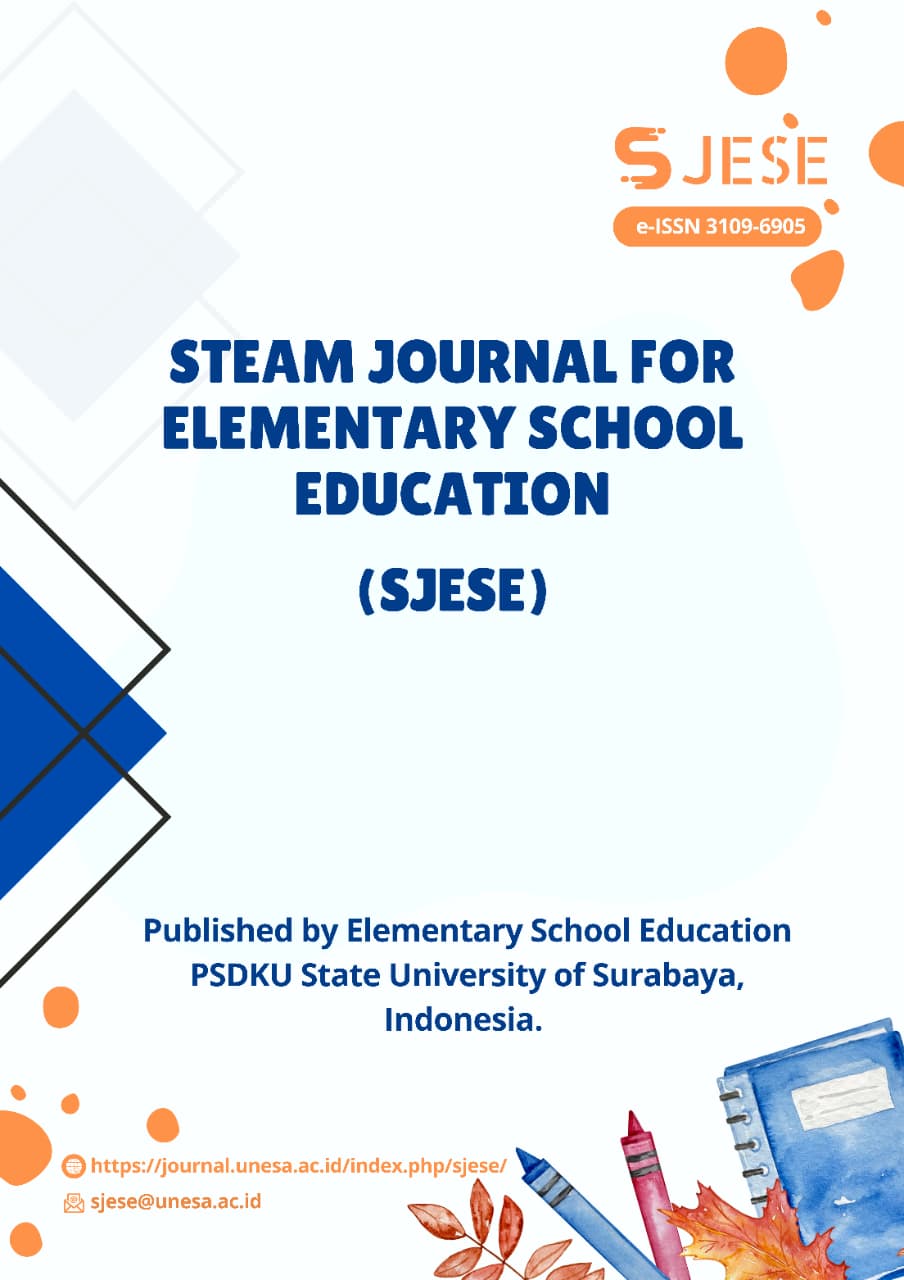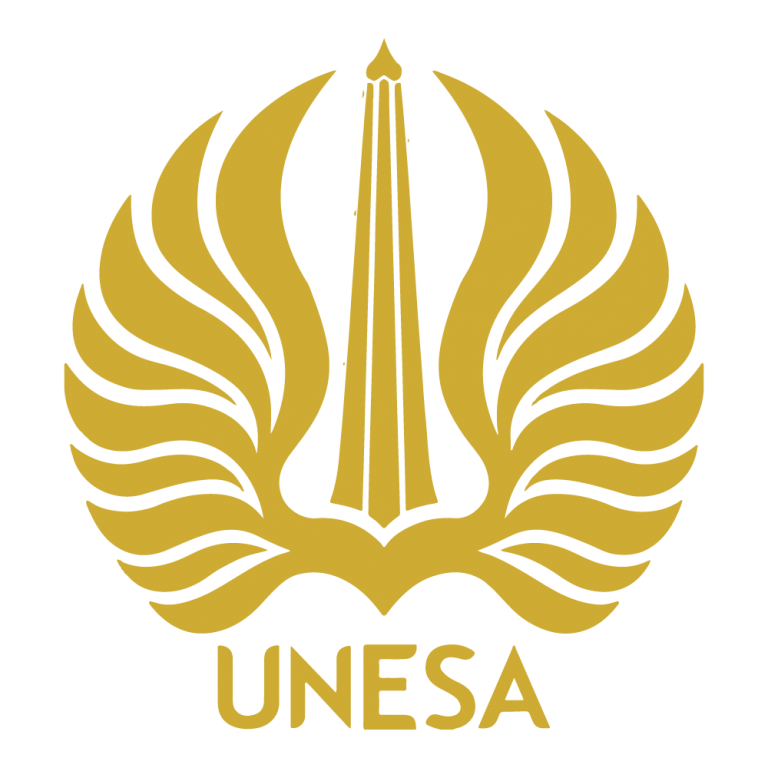STEAM in the Frame of Independent Curriculum in Elementary School
DOI:
https://doi.org/10.26740/sjese.1.01.2025.4Keywords:
4C Skills, Independent Curriculum, Learning Activities, Learning Outcomes, STEAMAbstract
The independent curriculum is a curriculum that was implemented in Indonesia in 2021 until now. Various approaches are implemented in the curriculum, one of which is STEAM. The purpose of writing this article is to identify and analyze the STEAM approach in elementary school learning that is aligned with the principles of the Merdeka Curriculum, and provide recommendations for developing contextual and integrative learning that supports the achievement of the Pancasila learner profile and 4C skills, student activities, and learning outcomes. The research method used is a literature study by reviewing journals as literature recorded in Sinta, Garuda, and indexed nationally and internationally. The results showed that there are many learning models that integrate with the STEAM approach in the independent curriculum which effectively provide results in increasing the achievement of the Pancasila learner profile, 4C skills, student activity, and learning outcomes. This STEAM approach encourages students to be active in various learning activities designed by teachers in the independent curriculum and gain direct experience both theoretically and practically.
References
Adlina, N. (2022) “Inovasi Pembelajaran di Masa Pandemi COVID-19 dengan Pendekatan STEAM di Era Society 5.0,” JURNAL SYNTAX IMPERATIF : Jurnal Ilmu Sosial dan Pendidikan, 2(6), hal. 120. Tersedia pada: https://doi.org/10.36418/syntax-imperatif.v2i6.134.
Davies, D. et al. (2013) “Creative learning environments in education—A systematic literature review,” Thinking Skills and Creativity, 8, hal. 80–91. Tersedia pada: https://doi.org/https://doi.org/10.1016/j.tsc.2012.07.004.
Erawan, G.M. dan Mariana, N. (2025) “Development and Challenges of STEAM Learning Implementation in Elementary Schools : A Comprehensive Literature Review,” 3(1), hal. 1–19.
Fauziah, N., Ichsan, I. dan Irbah, A.N. (2022) “Pengaruh Model Pembelajaran Steam Berbasis Loose Part Terhadap Kemandirian Anak Usia Dini,” Jurnal PG-PAUD Trunojoyo : Jurnal Pendidikan dan Pembelajaran Anak Usia Dini, 9(2), hal. 18–27. Tersedia pada: https://doi.org/10.21107/pgpaudtrunojoyo.v9i2.14746.
Fitriyah, A. dan Ramadani, S.D. (2021) “Pengaruh Pembelajaran Steam Berbasis Pjbl ( Project-Based Learning ) Terhadap Keterampilan,” Journal Of Chemistry And Education (JCAE), X(1), hal. 209–226.
Fitriyah, C.Z. dan Wardani, R.P. (2022) “Paradigma Kurikulum Merdeka Bagi Guru Sekolah Dasar,” Scholaria: Jurnal Pendidikan dan Kebudayaan, 12(3), hal. 236–243. Tersedia pada: https://doi.org/10.24246/j.js.2022.v12.i3.p236-243.
Huberman, M.B.M.A.M. (2014) Analisis data kualitatif : buku sumber tentang metode-metode baru. Jakarta: UI Press.
Ismiati, N. (2024) “Implementing STEAM education in the independent curriculum: Enhancing 21st century skills,” Tadibia Islamika, 4(1), hal. 21–27.
June, N. dan Muzaini, M.C. (2024) “Effectiveness of STEAM-Integrated Project-Based Learning to Improve Creative and Collaborative Thinking Skills of Elementary School Students,” 14(1), hal. 106–120. Tersedia pada: https://doi.org/10.18952/aladzkapgmi.v14i1.13749.
Leavy, A. et al. (2023) “The prevalence and use of emerging technologies in STEAM education: A systematic review of the literature,” Journal of Computer Assisted Learning, 39(4), hal. 1061–1082. Tersedia pada: https://doi.org/10.1111/jcal.12806.
Marsela Yulianti et al. (2022) “Peran Guru Dalam Mengembangan Kurikulum Merdeka,” Jurnal Ilmu Pendidikan dan Sosial, 1(3), hal. 290–298. Tersedia pada: https://doi.org/10.58540/jipsi.v1i3.53.
Mu’minah, I.H. (2021) “Studi Literatur: Pembelajaran Abad-21 Melalui Pendekatan Steam (Science, Technology, Engineering, Art, and Mathematics) dalam Menyongsong Era Society 5.0,” Prosiding Seminar Nasional Pendidikan, 3, hal. 584–594.
Nikmatin Mabsutsah dan Yushardi, Y. (2022) “Analisis Kebutuhan Guru terhadap E Module Berbasis STEAM dan Kurikulum Merdeka pada Materi Pemanasan Global,” Jurnal Pendidikan Mipa, 12(2), hal. 205–213. Tersedia pada: https://doi.org/10.37630/jpm.v12i2.588.
Pahri (2023) “Peran Pendidikan dalam Pengembangan Karakter di Era 4.0 - Kompasiana.com,” 5(7), hal. 275–283. Tersedia pada: https://www.kompasiana.com/pahrirzk2646/64b28948e1a1670e5d2faff2/peran-pendidikan-dalam-pengembangan-karakter-di-era-4-0.
Permatasari, N.S. (2023) “Pentingnya Pendidikan Karakter Untuk Siswa Sekolah Dasar di Era 4.0,” Al-Abshar: Journal of Islamic Education Management, 2(2), hal. 176–189. Tersedia pada: https://doi.org/10.58223/al-abshar.v2i2.107.
Quigley, C.F. et al. (2020) “STEAM Designed and Enacted: Understanding the Process of Design and Implementation of STEAM Curriculum in an Elementary School,” Journal of Science Education and Technology, 29(4), hal. 499–518. Tersedia pada: https://doi.org/10.1007/s10956-020-09832-w.
Rahayu, N. dan Amanahtillah, D. (2024) “The Effect of STEAM on Student Learning Activities in Elementary School,” 13(3), hal. 1–14.
Ripandi, A.J. (2023) “Hakikat Kurikulum Dalam Pendidikan,” Jurnal Al Wahyu, 1(2), hal. 123–133. Tersedia pada: https://doi.org/10.62214/jayu.v1i2.129.
Rusmini, N.N., Lasmawan, I.W. dan Candiasa, I.M. (2023) “Developing Digital Teaching Module of Social-Science Subject Based Steam Method for Grade Four Elementary School Students,” Indonesian Journal of Educational Development (IJED), 4(2), hal. 150–157. Tersedia pada: https://doi.org/10.59672/ijed.v4i2.2974.
Santi, E.L. (2022) “Pendekatan STEAM Pada Project Based Learning Mewujudkan Merdeka Belajar Untuk Meningkatkan Kreativitas Siswa,” Jurnal Pendidikan Dasar, 3(2), hal. 77–81. Tersedia pada: http://jurnal.umpwr.ac.id/index.php/jpd/article/view/2240.
Umami, M.R., Saputra, H.J. dan Kiswoyo, K. (2023) “Efektifitas Pembelajaran Melalui Steam Pada Kurikulum Merdeka Di Sdn Palebon 01 Semarang,” Wawasan Pendidikan, 3(2), hal. 669–678. Tersedia pada: https://doi.org/10.26877/wp.v3i2.16277.
Vhalery, R., Setyastanto, A.M. dan Leksono, A.W. (2022) “Kurikulum Merdeka Belajar Kampus Merdeka: Sebuah Kajian Literatur,” Research and Development Journal of Education, 8(1), hal. 185. Tersedia pada: https://doi.org/10.30998/rdje.v8i1.11718.
Zayyinah, Z. et al. (2022) “STEAM-Integrated Project Based Learning Models: Alternative to Improve 21st Century Skills,” Proceedings of the Eighth Southeast Asia Design Research (SEA-DR) & the Second Science, Technology, Education, Arts, Culture, and Humanity (STEACH) International Conference (SEADR-STEACH 2021), 627, hal. 251–258. Tersedia pada: https://doi.org/10.2991/assehr.k.211229.039.
Downloads
Published
Issue
Section
 Abstract views: 134
,
Abstract views: 134
, PDF Downloads: 256
PDF Downloads: 256









